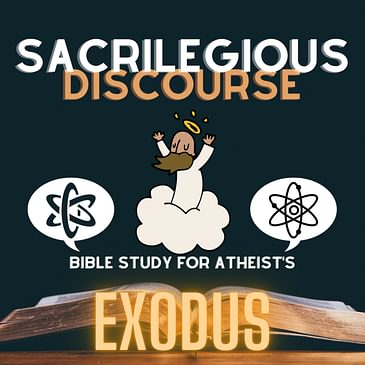Husband and Wife cover Exodus chapter 33:
The Lord's Presence Promised;
and chapter 34:
The Second Table of Stone / Israel Warned of the Idolatry of Canaan / The Three Anointed Feasts / Moses and the Tables of the Law.
Husband requests milk and loses his cool when God continues to be a hypocrite. Also, it turns out that Yahweh literally translates to jealous, which makes total sense. And what, pray tell, is God's beef with yeast?
Join us on DISCORD: https://discord.gg/8RwwMrb5zK
Skip the ads by joining Acast+ https://plus.acast.com/s/6331d364470c7900137bb57d
Thank you for stopping by Sacrilegious Discourse - Bible Study for Atheists!
Check out these links for more information about our podcast and merchandise:
Our Homepage: https://sacrilegiousdiscourse.com/
Help support us by subscribing on Patreon: https://www.patreon.com/sacrilegiousdiscourse
In Exodus chapters 33 and 34, the biblical god gives Moses the Ten Commandments and other laws for the Israelites to follow. From an atheist perspective, these laws are simply the product of human imagination. They are not divinely inspired, and they do not have any special moral or ethical authority.
The Ten Commandments, for example, are a list of religious and moral prohibitions that are often cited as the foundation of Western law and morality. However, from an atheist perspective, these commandments are no more or less valid than any other set of rules or laws. They are simply the product of a particular culture and time period, and they reflect the values and beliefs of those who created them.
The other laws that Moses receives from god in Exodus chapters 33 and 34 are similarly open to interpretation. Some of these laws may have been practical or necessary for the Israelites at the time, while others may simply reflect the prejudices or biases of the people who wrote them.
Ultimately, the meaning and significance of Exodus chapters 33 and 34 are up to each individual to decide. However, from an atheist perspective, these chapters are simply a collection of ancient texts that provide insights into the beliefs and values of the people who wrote them. They do not provide any evidence for the existence of a god, nor do they have any special moral or ethical authority.
Hosted on Acast. See acast.com/privacy for more information.






